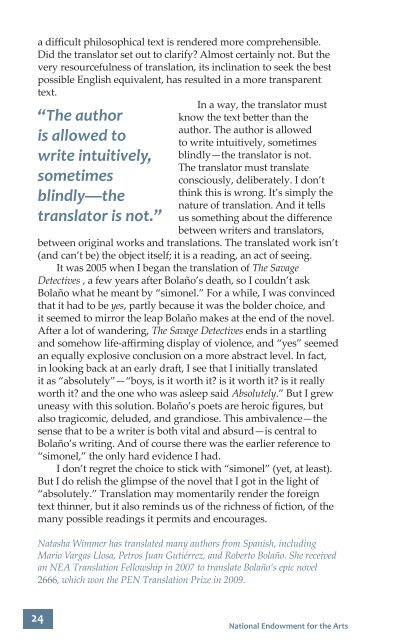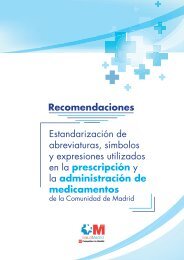lKd7nD
lKd7nD
lKd7nD
Create successful ePaper yourself
Turn your PDF publications into a flip-book with our unique Google optimized e-Paper software.
a difficult philosophical text is rendered more comprehensible.<br />
Did the translator set out to clarify Almost certainly not. But the<br />
very resourcefulness of translation, its inclination to seek the best<br />
possible English equivalent, has resulted in a more transparent<br />
text.<br />
“The author<br />
is allowed to<br />
write intuitively,<br />
sometimes<br />
blindly—the<br />
translator is not.”<br />
In a way, the translator must<br />
know the text better than the<br />
author. The author is allowed<br />
to write intuitively, sometimes<br />
blindly—the translator is not.<br />
The translator must translate<br />
consciously, deliberately. I don’t<br />
think this is wrong. It’s simply the<br />
nature of translation. And it tells<br />
us something about the difference<br />
between writers and translators,<br />
between original works and translations. The translated work isn’t<br />
(and can’t be) the object itself; it is a reading, an act of seeing.<br />
It was 2005 when I began the translation of The Savage<br />
Detectives , a few years after Bolaño’s death, so I couldn’t ask<br />
Bolaño what he meant by “simonel.” For a while, I was convinced<br />
that it had to be yes, partly because it was the bolder choice, and<br />
it seemed to mirror the leap Bolaño makes at the end of the novel.<br />
After a lot of wandering, The Savage Detectives ends in a startling<br />
and somehow life-affirming display of violence, and “yes” seemed<br />
an equally explosive conclusion on a more abstract level. In fact,<br />
in looking back at an early draft, I see that I initially translated<br />
it as “absolutely”—“boys, is it worth it is it worth it is it really<br />
worth it and the one who was asleep said Absolutely.” But I grew<br />
uneasy with this solution. Bolaño’s poets are heroic figures, but<br />
also tragicomic, deluded, and grandiose. This ambivalence—the<br />
sense that to be a writer is both vital and absurd—is central to<br />
Bolaño’s writing. And of course there was the earlier reference to<br />
“simonel,” the only hard evidence I had.<br />
I don’t regret the choice to stick with “simonel” (yet, at least).<br />
But I do relish the glimpse of the novel that I got in the light of<br />
“absolutely.” Translation may momentarily render the foreign<br />
text thinner, but it also reminds us of the richness of fiction, of the<br />
many possible readings it permits and encourages.<br />
Natasha Wimmer has translated many authors from Spanish, including<br />
Mario Vargas Llosa, Petros Juan Gutiérrez, and Roberto Bolaño. She received<br />
an NEA Translation Fellowship in 2007 to translate Bolaño’s epic novel<br />
2666, which won the PEN Translation Prize in 2009.<br />
24<br />
National Endowment for the Arts



